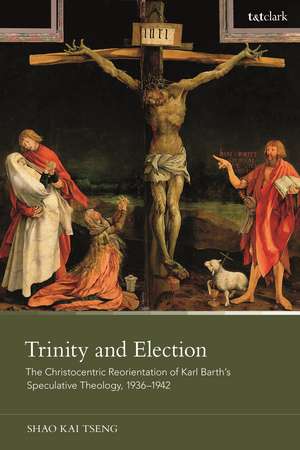Trinity and Election: The Christocentric Reorientation of Karl Barth’s Speculative Theology, 1936-1942
Autor Dr. Shao Kai Tsengen Limba Engleză Paperback – 21 aug 2024
| Toate formatele și edițiile | Preț | Express |
|---|---|---|
| Paperback (1) | 192.48 lei 3-5 săpt. | |
| Bloomsbury Publishing – 21 aug 2024 | 192.48 lei 3-5 săpt. | |
| Hardback (1) | 511.57 lei 6-8 săpt. | |
| Bloomsbury Publishing – 22 feb 2023 | 511.57 lei 6-8 săpt. |
Preț: 192.48 lei
Preț vechi: 249.97 lei
-23% Nou
Puncte Express: 289
Preț estimativ în valută:
36.83€ • 37.100$ • 30.74£
36.83€ • 37.100$ • 30.74£
Carte disponibilă
Livrare economică 05-19 martie
Preluare comenzi: 021 569.72.76
Specificații
ISBN-13: 9780567709356
ISBN-10: 0567709353
Pagini: 280
Dimensiuni: 156 x 234 x 25 mm
Greutate: 0.4 kg
Editura: Bloomsbury Publishing
Colecția T&T Clark
Locul publicării:London, United Kingdom
ISBN-10: 0567709353
Pagini: 280
Dimensiuni: 156 x 234 x 25 mm
Greutate: 0.4 kg
Editura: Bloomsbury Publishing
Colecția T&T Clark
Locul publicării:London, United Kingdom
Caracteristici
The book explores Barth's theology of nationhood from a fresh angle, a frequently mentioned topic that remains largely untapped at the level of academic research
Notă biografică
Shao Kai Tseng is ZJU100 Research Professor in the School of Philosophy, Zhejiang University, China
Cuprins
Introduction Chapter 1: Sketching the Background: The Post-Kantian Paradigm Re-examinedChapter 2: Sketching the Background: Barth and the Intellectual History of Speculative TheologyChapter 3: Sketching the Contours: Actualistic Ontology and Speculative TheologyChapter 4: Painting the Portrait: The Christocentric Reorientation of Barth's Speculative Theology in 1936Chapter 5: Painting the Portrait: Barth's Christocentric Revision of Vestigium Trinitatis Speculation in 1938Chapter 6: Painting the Portrait: Solidifying the Basically Chalcedonian Form of Speculative Identity in 1942Chapter 7: Framing the Picture: Barth's Speculative Theology of Nationhood: Christocentric Reflections from 1936-1938ConclusionBibliographyIndex
Recenzii
In this compelling work, Shao Kai Tseng offers a careful, detailed, sophisticated and convincing alternative to both ahistorical and historicized readings of Karl Barth with practical implications regarding social and political matters. By carefully considering the Anselmian and Hegelian moments in Barth's theology, this important book moves Barth studies beyond the problems embedded in McCormack's view of Barth's "actualism." Anyone interested in Barth's theology today will surely want to read this book.
Tseng's illuminating analysis of Barth's Christological concentration in the 1930s confirms the far-reaching theological fruitfulness of in-depth studies of Barth's theological development. It is on the precise determination of election and Trinity that the clarity of Barth's chosen path is decided. At the same time, the political implications that Tseng finally brings into focus show that his emphasis on the speculative character of Barth's thought is by no means in complete contradiction to a critical rationalism that Barth is attested by others.
Over against the neo-Kantian paradigm that has drawn so much attention these last decades, Tseng offers us a fascinating new reading of the intellectual impetus of Barth's mature theology. There may be (too) many books about Barth; but this is one any serious Barth scholar will have to reckon with.
Tseng's illuminating analysis of Barth's Christological concentration in the 1930s confirms the far-reaching theological fruitfulness of in-depth studies of Barth's theological development. It is on the precise determination of election and Trinity that the clarity of Barth's chosen path is decided. At the same time, the political implications that Tseng finally brings into focus show that his emphasis on the speculative character of Barth's thought is by no means in complete contradiction to a critical rationalism that Barth is attested by others.
Over against the neo-Kantian paradigm that has drawn so much attention these last decades, Tseng offers us a fascinating new reading of the intellectual impetus of Barth's mature theology. There may be (too) many books about Barth; but this is one any serious Barth scholar will have to reckon with.
